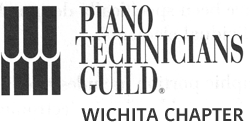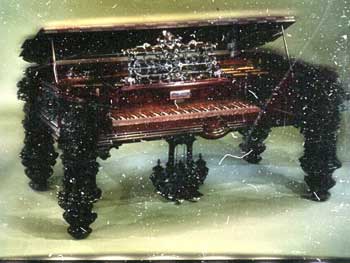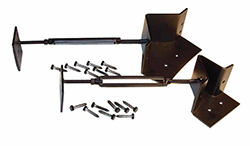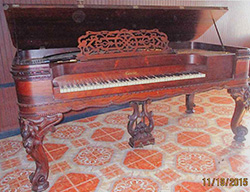
3 February 2016

3 February 2016
 Wichita Chapter PTG officers
Wichita Chapter PTG officers
President Joe Wisner
Vice President Gary Telleen
Secretary David Norman
Treasurer Marty Hess
Newsletter Editor Roy Howard (with assistance from Kent Willis)
Next Meeting Thursday, February 11, at 7pm
For previous chapter newsletters see INDEX
The February 11th meeting will be held at Marty Hess's home, 3900 Parkwood Ln, Bel Aire, KS 67220
 Greetings all!
Greetings all!
We had a great meeting at Roy Howard's place last month. The subjects and discussions were, I thought, excellent. Where else can a group of competing professional business persons/craftsmen get together raise the skills and competence of all.
I am looking forward to future such quality events. Our next meeting will be at the home of Marty Hess at 7:00pm on February 11, 2016.
I need to know how many of you are committed to attending a social event on March 10th, our regular meeting date. I have visited Adrian's restaurant 2121 N. Rock Rd. Suite 300 Wichita, Kansas 67206 and believe it to be a good place to have our first get together w/spouses. Please talk it over with your spouse and then let me know one way or the other. If there is not enough interest, then I need to go to plan B.
Hope to see you at Marty's.
Joe Wisner
Video: Highlights of Marty Hess's tool kit that he takes into a service call.
Video: Joe Wisner shares Tool Case Tips.
Video: Highlights of a discussion about tool ideas to tie the hitch pin loop.
Video: Tool ideas to reset the hammer return spring.
Video: Adjusting key up-weight and down-weight.
Video: A simple tension rod serves to measure the length for a missing pedal lyre support rod.
Video: A simple dowel attached with elastic holds the drop stickers in place for action removal.
Please submit articles and tips for the newsletter and the meetings.

The donated band instruments for Uganda are starting to ship from Spain to help the Happy Angels Youth Brass Band learn to repair so that individuals can become luthiers.
Conference 2016 in Ecuador is scheduled for four weeks in June, covering topics for techs and musicians of strings, woodwinds, brass, and pianos.
Don't miss the February technical at Marty's house.
Measure in Millimeters Video
Piano bass string replacement is a repair procedure piano technicians need to get right the first time. Determining a few sample lengths in (mm) units is the best assurance for obtaining strings that are right the first time.
 Treble Tone Resonator is designed by Robert Grijalva RPT, and current director and professor of piano technology at the University of Michigan. The Treble Tone Resonators are meant to be installed on grand pianos that have demonstrated a need for additional belly rail support in the melody section (notes 64 to 74) where there is a distinct lack of power and all known voicing techniques have failed.
Treble Tone Resonator is designed by Robert Grijalva RPT, and current director and professor of piano technology at the University of Michigan. The Treble Tone Resonators are meant to be installed on grand pianos that have demonstrated a need for additional belly rail support in the melody section (notes 64 to 74) where there is a distinct lack of power and all known voicing techniques have failed.
Pianos that typically benefit from this are those possessing a treble bell, without a support beam from the rim to the belly rail in the treble section.
By adjusting the tension with turnbuckle, the weldment (attached to the rim of the piano on one end, and the belly rail on the other) distributes support evenly along the belly rail. This complements the radial beam design found in many pianos, enhancing projection, power, and clarity of tone.
#RH-4TRL Treble Tone Resonator (over 7') $155.00
#RH-4TR Treble Tone Resonator (7' or less) $145.00
To view full information go to PianoTek Supply.
NEWS
Renew Membership for 2016
Dues invoices for 2016 were mailed November 1. Use the Pay Online feature at www.ptg.org to pay your invoice securely and quickly 24/7. If you haven't received your invoice yet, please contact Sandy Roady (sandy@ptg.org.)
www.PTGWestPac.org March 31 - April 3, 2016 Piano Technicians Guild, Western and Pacific Northwest Region Piano Technicians Guild, Seattle 2016 WestPac VI Online Registration Now Open! Exceptional All-Day Seminars Special Guest and Premier Instructors Food and Beverage Every Day Breakfast Buffet • Breaks • Lunch Buffet Fine Food and Entertainment Evenings National Exhibitors and Vendors 4,000 Sq. Ft. • Over 30 Booths
www.PTGNEECSO.org
April 14 - April 17, 2016
Piano Technicians Guild, New England Eastern Canada Seminar Organization
Piano Technicians Guild, Nashua 2016 NEECSO
Online Registration Now Open!
Exceptional All-Day Seminars
Special Guest and Premier Instructors
Food and Beverage Every Day
Breakfast Buffet • Breaks • Lunch Buffet
Fine Food and Entertainment Evenings
National Exhibitors and Vendors
4,000 Sq. Ft. • Over 30 Booths
Go For Free, Come Home an RPT - Foundation Scholarship Available
If you're an Associate member interested in a free convention registration and someone to cover the cost of your third and final RPT exam, consider applying for the Piano Technicians Guild Foundation's Associate Scholarship. Download an application and instructions. Applications must be received at the PTG Home Office on or before April 1, 2016.
37 Steps Class in Kansas City
There are only a few slots available in the April 28 - 30, 2016 Grand Action Regulation in 37 Steps class. Held at the PTG Home Office in Kansas City, it includes three days of intensive hands-on learning. Click to register online or call 913-432-9975 to register by phone.
Piano Jobs
Click here to go directly to the new Piano Jobs community.
Online Classifieds at www.ptg.org
Piano Technicians Journal Media on YouTube
For PTG member resources go to www.my.ptg.org
The Journal Chapter Technical. Please share the interesting and meaningful technical programs you have conducted that can be reproduced by other chapters.
 Send your articles and pictures to:
Send your articles and pictures to:
John Parham
john440@me.com
828-244-2487
 Square Grand. Owner in Plevna, KS is asking $5000. It is tuneable but needs 20 custom keys made to finish the restoration. (Stephen Francis)
Square Grand. Owner in Plevna, KS is asking $5000. It is tuneable but needs 20 custom keys made to finish the restoration. (Stephen Francis)
 A professional uses higher emotional tones: Enthusiasm, cheerfulness, interest, contentment. An amateur uses lower emotional tones: anger, hostility, resentment, fear, victim.
A professional uses higher emotional tones: Enthusiasm, cheerfulness, interest, contentment. An amateur uses lower emotional tones: anger, hostility, resentment, fear, victim.
Subscribe to the PTG YouTube Channel